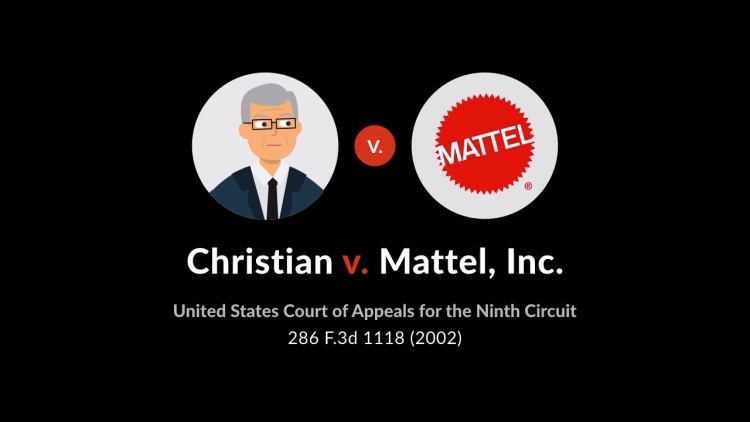Christian v. Mattel, Inc.
United States Court of Appeals for the Ninth Circuit
286 F.3d 1118 (2002)
- Written by Angela Patrick, JD
Facts
In 1959, Mattel, Inc. (defendant) began manufacturing what would become the famous Barbie doll. Over the years, Mattel registered numerous Barbie-related copyrights, including some to protect the doll’s head sculpture. After 1991, the dolls contained a copyright notice printed directly on the back of their heads. In 1990, Claudene Christian created and marketed a cheerleader doll. Claudene and her father, Harry Christian (plaintiff), created the Collegiate Doll Company. The company copyrighted the Claudene doll in 1997. Harry hired attorney James Hicks to sue Mattel, alleging that two Barbie dolls infringed upon the Claudene doll’s copyright. Mattel presented evidence that the allegedly infringing Barbie dolls had been copyrighted in 1976 and 1991, well before the Claudene doll’s 1997 copyright. This evidence established that the Barbie dolls could not have infringed on the later Claudene copyright. During a litigation conference, Mattel tried to explain to Hicks that the complaint was frivolous by showing him the copyright notice on the 1991 Barbie’s head. Hicks threw the dolls in anger. Hicks had a history of litigation misconduct in other cases. Hicks also disrupted Harry’s deposition, berated Harry in front of Mattel’s attorney, violated the court’s briefing rules, and made multiple misstatements of fact and law to the court. Some misrepresentations were in signed pleadings, and others were made orally at hearings. Mattel filed a motion for sanctions under Federal Rule of Civil Procedure 11. The district court found that Hicks should have known that the Mattel dolls were created before the Claudene dolls and that the complaint he filed was frivolous. The court also found that Hicks had behaved “boorishly” during the discovery process and had misrepresented information during oral hearings. The court sanctioned Hicks under Rule 11 and ordered him to pay Mattel’s attorney’s fees, which were approximately $500,000. Hicks appealed the sanctions order to the United States Court of Appeals for the Ninth Circuit.
Rule of Law
Issue
Holding and Reasoning (McKeown, J.)
What to do next…
Here's why 907,000 law students have relied on our case briefs:
- Written by law professors and practitioners, not other law students. 47,100 briefs, keyed to 996 casebooks. Top-notch customer support.
- The right amount of information, includes the facts, issues, rule of law, holding and reasoning, and any concurrences and dissents.
- Access in your classes, works on your mobile and tablet. Massive library of related video lessons and high quality multiple-choice questions.
- Easy to use, uniform format for every case brief. Written in plain English, not in legalese. Our briefs summarize and simplify; they don’t just repeat the court’s language.






